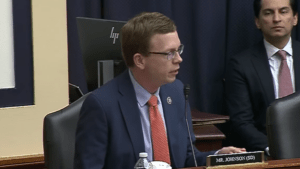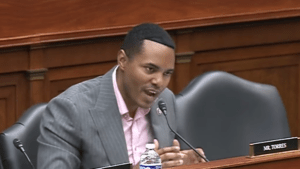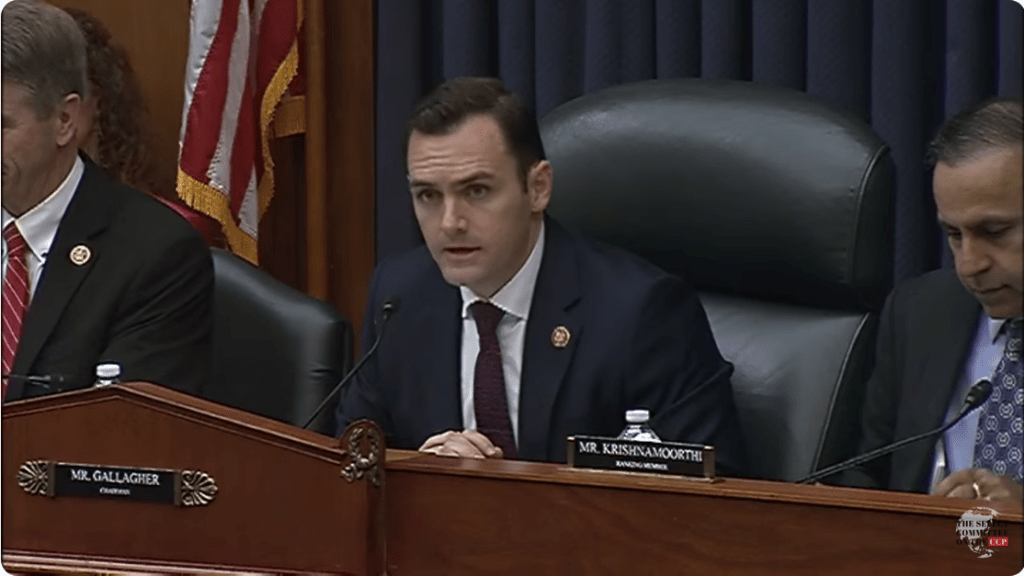The House Select Committee on the CCP met Tuesday morning for the final passage of its 52-page strategy report to be submitted to the full House. At the meeting, it became clear by Committee member comments that China unites both parties. Everyone is worried about China. Everyone does not want to cede U.S. economic might and security to the Chinese Communist Party. But not everyone agrees on decoupling, tariffs, and industrial policy.
Rep. Dusty Johnson (R-SD) was the first Select Committee member to speak about the report, titled “Reset, Prevent, Build: A Strategy to Win America’s Economic Competition With the CCP.” He supported the report, as did everyone in the room, but with caveats. These are the wedge topics that make China legislation difficult. National security seems to be the best framing to win over those who are concerned about government encroachment on private business.
 “There are times when some in U.S. industry will ask for China-style intervention in our markets,” he said at the 20-minute meeting. “They are interested in protectionism and industrial policy. I think we made an error in going too far down that path in this report. There were important trade-offs to make sure we got to a place where we had overwhelming support for this report…but the challenge for us will be to make sure that the provisions in this report are maintained for national security purposes rather than for protectionism or industrial policy,” he said. “How we write these bills will matter. We don’t want to encourage rent-seeking, where decisions are made by lobbyists and attorneys here in Washington. I think we can rebalance our relationship with China and I am a proud ‘yes’ on that. But we have to focus on implementation that is good for free markets rather than hold them back.”
“There are times when some in U.S. industry will ask for China-style intervention in our markets,” he said at the 20-minute meeting. “They are interested in protectionism and industrial policy. I think we made an error in going too far down that path in this report. There were important trade-offs to make sure we got to a place where we had overwhelming support for this report…but the challenge for us will be to make sure that the provisions in this report are maintained for national security purposes rather than for protectionism or industrial policy,” he said. “How we write these bills will matter. We don’t want to encourage rent-seeking, where decisions are made by lobbyists and attorneys here in Washington. I think we can rebalance our relationship with China and I am a proud ‘yes’ on that. But we have to focus on implementation that is good for free markets rather than hold them back.”
Watch the full meeting here.
The strategy report was a culmination of the new committee’s five hearings of 2023, two round table hearings, and travels throughout the U.S. and abroad to read the tea leaves on U.S. China relations in the business community.
The Committee has its work cut out for it, with private capital well plugged into Washington and against the capital market restrictions espoused in the strategy report. But the biggest stumbling block will come from Congress itself. On one hand, writing bills that help the U.S. against China is something the electorate supports, as do members of both parties. On the other, doing so in a way that doesn’t massively disrupt U.S. business interests, or the interests of Silicon Valley and Wall Street is a tough row to hoe.
Even Massachusetts Democrats agree with Johnson of South Dakota.
“There’s much good in the report, but I am worried about the promotion of industrial policy,” said Rep. Jake Auchincloss (D-MA-4).
Where China Trade Policy Hits a Wall
Three Committee members spoke out about where the strategy report came down directionally on trade.
Rep. Darin LaHood (R-IL-16) did not like removing China from its Most Favored Nation status, something bestowed on nearly all members of the World Trade Organization. “I had concerns related to PNTR (for China). I have concerns about going down a protectionist path as it relates to certain sectors of our economy, like agriculture.”
 Rep. Ritchie Torres (D-NY-15) said he didn’t like the idea of moving China to Column 2 idea of the harmonized tariff schedule. That would instantly crank up the percentage rate on all China imports, rather than the ones targeted, steel, solar and the Section 301 tariffs.
Rep. Ritchie Torres (D-NY-15) said he didn’t like the idea of moving China to Column 2 idea of the harmonized tariff schedule. That would instantly crank up the percentage rate on all China imports, rather than the ones targeted, steel, solar and the Section 301 tariffs.
“We should derisk but not decouple. We are too dependent on them for clean energy technology, for pharmaceutical inputs. Moving to column 2 could lead to economic retaliation that we are not prepared for,” Torres said. “We don’t have the trade policies in place. We have to be tough on the CCP, but be wise about how we tackle the issue.”
Rep. Neal Dunn (R-FL-2) said that the House should stop debating the renewal of the Generalized System of Preferences, a low-tariff policy for frontier and emerging markets, and just renew it now. “We should have done that three years ago,” he said. “We say we should reform it. I think the fastest way to do this is just to reauthorize it. We need a clean reauthorization of the GSP.”
Rep. Haley Stevens (R-MI-11) spoke about the auto industry in her talk about the report’s recommendation to Congress about increasing funding for government science and research. She expressed concern that the U.S. does not have any leading EV battery producers, and sounded unconvinced that the U.S. would ever lead in autonomous vehicle production.
But on balance, the Committee was united in their support for the recommendations. Given the different viewpoints on trade, tax incentives and tariffs, it is commendable that the 24 members were able to sign off on the report.
“What the CCP fears the most is bipartisan support against them, and we put a plan here that I think can be successful,” LaHood said.
Rep. Robert Wittman (R-VA-1) called the report a foundational work for Congress in 2024. “Other committees should use the good will we have developed here to move forward and get legislation onto the House floor,” he said.
In a rare display of Washington unity, Ranking Member Raja Krishnamoorthi (D-IL-8) thanked Chairman Mike Gallagher (R-WI–8) for the bipartisanship, adding, “We want to move these recommendations into legislation as soon as possible.”













